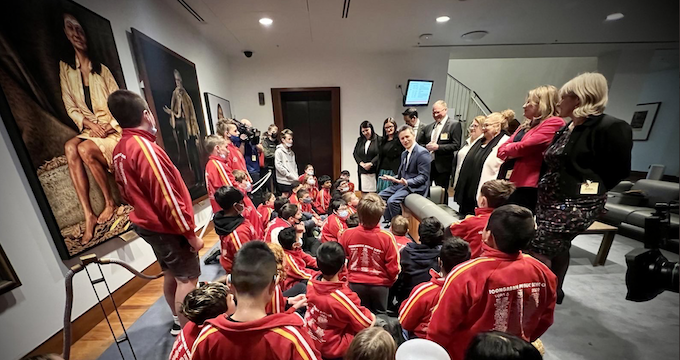The federal minister for education Jason Clare convened a roundtable to solve the teacher shortage on the eve of the new government’s Job Summit. Items on the agenda? It wasn’t hard to go past working conditions, status, and a growing, chronic teacher shortage as the impetus for history-making industrial action and considerable media coverage.
Concerns about teachers’ working conditions have themselves arisen out of a context in which teacher quality, figures of the ‘good’ and ‘bad’ teacher, the fear of indoctrinating teachers, have been increasingly constructed as ‘policy problems’ to be addressed. ‘The teacher’, it seems, is becoming one of the most contested figures in contemporary education policy debates.
We have recently edited a Special Issue of the journal Education Policy Analysis Archives in which the collected papers reflect on the current positioning of teachers across a range of international policy contexts. This journal, unlike the majority of academic journals, is run by a university and is entirely open access, which means you can read the full issue. You can also watch a video introduction to the issue.
Look at Australia, for example
In our introduction to the issue, we use Australia as an example of a country in which responsibility has been placed on teachers to ‘fix’ perceived educational crises, often through policy reform that requires teachers to be ‘better’ trained, more professional, more accountable and more standardised. Here, the past fifteen years of education policy has featured: the introduction of standardised census testing of students via the National Assessment Programme, the results of which are made public via the My School website; the introduction of national teaching standards and accreditation requirements; and repeated inquiries into initial teacher education, with the introduction of program standards and, more recently, mandated teacher performance assessments.
Why are teachers so central to education policy?
Given all this policy change, we think it’s reasonable to claim that teachers are the targets of much political and popular consternation. But what is it about teachers that makes them such a matter of attention and concern, and how does the current political climate contribute to these (often unrealistic) expectations?
According to Wodak, populism has an “appeal to the ‘common man/woman’ as opposed to the elites”. She has argued that in populist regimes, ‘difference’ is denied and the ‘common’ is valorised, creating “a demos which exists above and beyond the divides and diversities of social class and religion, gender and generation”.
We argue that it is possible to view schooling (and teaching) as a logical site of public commentary because of the common experience amongst most populations. Indeed, it is often suggested that everyone knows what it is like to be a teacher because everyone has gone to school. As Lortie put it, there is an ‘apprenticeship of observation’ in school education that means everyone, regardless of whether they become a teacher or not, forms ideas about the work of teaching simply because of their ongoing interactions with teachers throughout a significant portion of their lives. In terms of populist tendencies, this widespread experience and presumed knowledge about how schools should operate, positions teachers as a common ground upon which critique can be aimed.
At the same time, teachers increasingly bear the burden for the economic, social and political wellbeing of the countries within which they teach. As the global economy becomes understood as essentially knowledge-based, the need to track and compare student achievement within and across nation-states has taken on a broad prominence typified by, for instance, the regular Programme for International Student Assessment (PISA) tests run by the Organisation for Economic Cooperation and Development (OECD). Indeed, teachers are an increasing point of focus for the OECD, which now also runs the Teaching and Learning International Survey (TALIS) examining teachers’ work and working conditions. This, we argue, reflects a revived and rearticulated emphasis on the teacher.
The teacher as an object of fear
Yet despite this apparent importance, teaching does not often become an object of respect, but rather of fear, emblematic of growing national and international anxieties around knowledge, success and the moral character of the next generation. This puts the figure of the teacher in an uncomfortable position. Paradoxically, teaching is known to all (“anyone could do it!”), yet also unknowable (as a university-based, complex and contested form of expertise). Teachers’ success is supposedly important for global competition, but teaching is not necessarily viewed as worthy of professional status and fair working conditions. Within this context, ongoing attempts to control, standardise and responsibilise teaching and teachers becomes a rational, even urgent pursuit. So much so that the resulting hyper-focus on teachers-as-solution has created what Wodak calls a “fear ‘market’”, where teachers become the target of an expanding “cottage industry” of commercial products (e.g., professional development materials, data-tracking platforms, etc.).
It’s time to destabilise global narratives of teachers
The papers in our Special Issue explore teachers’ work across contexts including the United States, Europe, and the Asia-Pacific. The journal in which the issue has been published is based at Arizona State University, meaning that the inclusion of studies from places like Australia, New Zealand and the Pacific Islands may make somewhat unfamiliar reading for many subscribers. This was intentional.
In Australia, education policy is often developed and analysed in reference to what Lingard has termed our common ‘reference societies’ of the US and UK. As researchers and authors, we are routinely asked to make our work ‘relevant’ by situating it in relation to such dominant international reform contexts. But what would happen if this demand was reversed? Should research emanating from dominant contexts instead be required to make itself relevant to more diverse, local spaces, and what analytical possibilities might this open up? Possibly, what is needed is to reimagine teachers and schooling in ways that are less limited by the systems and structures that have led us to this point. Perhaps it is time for teachers and those who research them to truly warrant their positioning as an object of fear, by destabilising the taken-for-granted terms under which they work.

From left: Meghan Stacey is senior lecturer in the UNSW School of Education, researching in the fields of the sociology of education and education policy. Taking a particular interest in teachers, her research considers how teachers’ work is framed by policy, as well as the effects of such policy for those who work with, within and against it. Mihajla Gavin is a senior lecturer at UTS Business School. Her PhD, completed in 2019, examined how teacher trade unions have responded to neoliberal education reform. Her current research focuses on the restructuring of teachers’ work and conditions of work, worker voice, and women and employment relations. Jessica Gerrard is an associate professor at the Melbourne Graduate School of Education. Jessica researches the changing formations, and lived experiences, of social inequalities in relation to education, activism, work and unemployment. She works across the disciplines of sociology, history and policy studies with an interest in critical methodologies and theories. Anna Hogan is senior research fellow in the School of Teacher Education and Leadership at the Queensland University of Technology. Her research focuses on education privatisation and commercialisation. She currently works on a number of research projects, including investigating philanthropy in Australian public schooling, the privatisation of global school provision, and the intensification of teachers’ work. Jessica Holloway is senior research and ARC DECRA Fellow at the Australian Catholic University. Her research draws on political theory and policy sociology to investigate: (1) how metrics, data and digital tools produce new conditions, practices and subjectivities, especially as this relates to teachers and schools, and (2) how teachers and schools are positioned to respond to the evolving and emerging needs of their communities.






